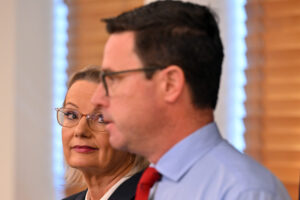Leaders’ debates can be useful, but no debate is better than a scrappy one

Robust debate is better than mealy-mouthed bipartisanship. Televised leaders’ debates can be a good thing if they illustrate the choices facing voters.
Tonight is the first televised debate between Albanese and Dutton. It will go out live on Sky News at 7.30pm.
But leaders’ debates aren’t the crucial campaign events they used to be. Whether they are worthwhile depends on the format – a scrappy and personal debate turns politics into a blood sport, and alienates voters from the political process itself.
Prime minister Robert Menzies abstained from the first ever televised election debate back in 1958, but his deputy Harold Holt and senior minister Billy McMahon faced off against Labor’s leader H. V. Evatt and deputy Arthur Calwell. Barely 18% of TV viewers bothered tuning in, according to one historian.
Prime ministers and opposition leaders didn’t start debating during elections until 1984. A lacklustre PM Bob Hawke faced off against opposition leader Andrew Peacock, who managed to win the debate but not the election. Hawke chose not to debate John Howard in 1987 but performed spectacularly in a rematch against Peacock in 1990. It was, by Hawke’s own account, the ‘highlight of the campaign’.
Since then, debates have been a fixture of election campaigns but they are by no means decisive. In 2004 John Howard was roundly bested in his TV debate against Labor’s Mark Latham in September 2004, with 67% of the audience favouring the latter. The following month Howard pulled off an historic win in both houses of parliament, and Latham was soon gone from federal parliament.
More recently, Bill Shorten won most of his debates against Malcolm Turnbull and Scott Morrison but lost both elections. The first debate in 2016 ranked 10th in the ratings (for a national broadcast, not good), and barely 93,000 people bothered watching to the end of the broadcast.
The debates between the current PM and his predecessor last time round were pretty ugly, with the second debate especially full of “fraught and shouty exchanges” and plenty of yelling over the top of the moderator, Nine’s Sarah Abo. Nine won the ratings, Albanese narrowly won the debate, but the public were the losers.
Election debates need to be about more than winning ratings. They need to be contests of ideas and visions, not shouting matches between posturing men.
Between the Lines Newsletter
The biggest stories and the best analysis from the team at the Australia Institute, delivered to your inbox every fortnight.
You might also like
Failing the test: Australian universities in crisis
Great countries have great institutions, but Australian universities are a mess.
The election exposed weaknesses in Australian democracy – but the next parliament can fix them
Australia has some very strong democratic institutions – like an independent electoral commission, Saturday voting, full preferential voting and compulsory voting. These ensure that elections are free from corruption; that electorate boundaries are not based on partisan bias; and that most Australians turn out to vote. They are evidence of Australia’s proud history as an
Gender parity closer after federal election but “sufficiently assertive” Liberal women are still outnumbered two to one
Now that the dust has settled on the 2025 federal election, what does it mean for the representation of women in Australian parliaments? In short, there has been a significant improvement at the national level. When we last wrote on this topic, the Australian Senate was majority female but only 40% of House of Representatives


